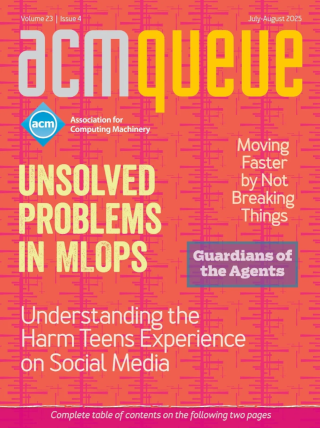
A Conversation with Mike Deliman:
And you think your operating system needs to be reliable.
Mike Deliman was pretty busy last January when the Mars rover Spirit developed memory and communications problems shortly after landing on the Red Planet. He is a member of the team at Wind River Systems who created the operating system at the heart of the Mars rovers, and he was among those working nearly around the clock to discover and solve the problem that had mysteriously halted the mission on Mars.
Electronic Voting Systems: the Good, the Bad, and the Stupid:
Is it true that politics and technology don’t mix?
As a result of the Florida 2000 election fiasco, some people concluded that paper ballots simply couldn’t be counted. Instead, paperless computerized voting systems were touted as the solution to “the Florida problem.” Replacing hanging chads with 21st century technology, proponents claimed, would result in accurate election counts and machines that were virtually impossible to rig. Furthermore, with nothing to hand-count and no drawn-out recounts to worry about, computerized voting systems were expected to enable the reporting of results shortly after the polls had closed.
Integrating RFID:
Data management and inventory control are about to get a whole lot more interesting.
RFID (radio frequency identification) has received a great deal of attention in the commercial world over the past couple of years. The excitement stems from a confluence of events. First, through the efforts of the former Auto-ID Center and its sponsor companies, the prospects of low-cost RFID tags and a networked supply chain have come within reach of a number of companies. Second, several commercial companies and government bodies, such as Wal-Mart and Target in the United States, Tesco in Europe, and the U.S. Department of Defense, have announced RFID initiatives in response to technology improvements.
Kode Vicious to the Rescue:
A koder with attitude, KV answers your questions. Miss Manners he ain’t.
Dear Kode Vicious, Where I work we use a mixture of C++ code, Python, and shell scripts in our product. I always have a hard time trying to figure out when it’s appropriate to use which for a certain job. Do you code in only assembler and C, or is this a problem for you as well?
The Burning Bag of Dung and Other Environmental Antipatterns:
And you think you have problems?
In my youth a favorite prank of the local delinquents was to place a paper bag full of doggy doo on a neighbor’s porch, light it on fire, ring the doorbell, and then flee. The home-owner, upon answering the door, had no choice but to stomp out the incendiary feces, getting their shoes dirty in the process. Why this scatological anecdote? Because it is a metaphor for work situations in which things have gotten so bad that the only way to “put the fire out” is to step into it. I call this the “burning bag of dung” antipattern.
The Magic of RFID:
Just how do those little things work anyway?
Many modern technologies give the impression they work by magic, particularly when they operate automatically and their mechanisms are invisible. A technology called RFID (radio frequency identification), which is relatively new to the mass market, has exactly this characteristic and for many people seems a lot like magic. RFID is an electronic tagging technology that allows an object, place, or person to be automatically identified at a distance without a direct line-of-sight, using an electromagnetic challenge/response exchange. Typical applications include labeling products for rapid checkout at a point-of-sale terminal, inventory tracking, animal tagging, timing marathon runners, secure automobile keys, and access control for secure facilities.
There’s Still Some Life Left in Ada:
When it comes to survival of the fittest, Ada ain’t no dinosaur.
Ada remains the Rodney Dangerfield of computer programming languages, getting little respect despite a solid technical rationale for its existence. Originally pressed into service by the U.S. Department of Defense in the late 1970s, these days Ada is just considered a remnant of bloated military engineering practices.
Thread Scheduling in FreeBSD 5.2:
To help get a better handle on thread scheduling, we take a look at how FreeBSD 5.2 handles it.
A busy system makes thousands of scheduling decisions per second, so the speed with which scheduling decisions are made is critical to the performance of the system as a whole. This article - excerpted from the forthcoming book, “The Design and Implementation of the FreeBSD Operating System“ - uses the example of the open source FreeBSD system to help us understand thread scheduling. The original FreeBSD scheduler was designed in the 1980s for large uniprocessor systems. Although it continues to work well in that environment today, the new ULE scheduler was designed specifically to optimize multiprocessor and multithread environments. This article first studies the original FreeBSD scheduler, then describes the new ULE scheduler. The article does not describe the realtime scheduler that is also available in FreeBSD.
Trials and Tribulations of Debugging Concurrency:
You can run, but you can’t hide.
We now sit firmly in the 21st century where the grand challenge to the modern-day programmer is neither memory leaks nor type issues (both of those problems are now effectively solved), but rather issues of concurrency. How does one write increasingly complex programs where concurrency is a first-class concern. Or even more treacherous, how does one debug such a beast? These questions bring fear into the hearts of even the best programmers.



